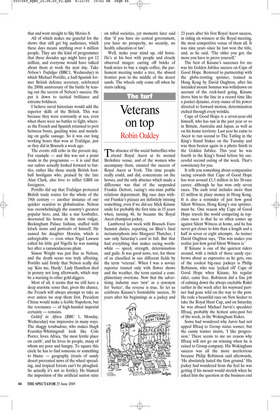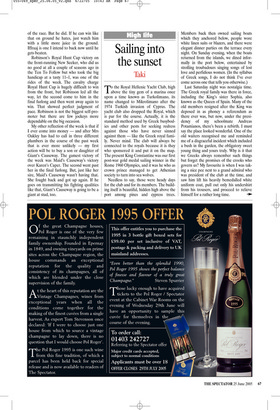Veterans on top
Robin Oakley
The absence of the social butterflies who attend Royal Ascot at its normal Berkshire venue, and of the women who accompany them, ensured the success of Royal Ascot at York. This time people really could, and did, concentrate on the horses, and the only absence which made a difference was that of the suspended Frankie Dettori, racing’s one-man public relations department. Big race days without Frankie’s pizzazz are definitely missing something, even if we did see Mick Kinane smile for probably the first time in 15 years when, turning 46, he became the Royal Ascot champion jockey.
Lumbered last week with Brussels Euro Summit duties, reporting on Blair’s final metamorphosis into Margaret Thatcher, I saw only Saturday’s card in full. But that had everything that makes racing worthwhile — speed, strength, determination and guile. It was good news, too, for those of us classified in our different fields by the term ‘veteran’. When I was a novice reporter trusted only with flower shows and the weather, the term carried a complimentary overtone. Now that the advertising industry uses ‘new’ as a synonym for ‘better’, the reverse is true. So let us celebrate Kinane’s formidable success, 30 years after his beginnings as a jockey and 23 years after his first Royal Ascot success, in riding six winners at the Royal meeting, the most competitive venue of them all. It was nine years since he last won the title, and, as he said, ‘The older you get, the more you have to prove yourself.’ The best of Kinane’s successes for me was his Golden Jubilee success on Cape of Good Hope. Restored to partnership with the globe-trotting sprinter, trained in Hong Kong by David Oughton, after his intended mount Somnus was withdrawn on account of the rock-hard going, Kinane drove him to the line in a record time like a pocket dynamo, every ounce of his power directed to forward motion, determination etched through every wrinkle.
Cape of Good Hope is a seven-year-old himself, who has run in the past year or so in Britain, Australia and Japan, as well as on his home territory. Last year he came to Ascot to run second to The Tatling in the King’s Stand Stakes on the Tuesday and was then beaten again in a photo finish in the Golden Jubilee. This year he was fourth in the King’s Stand before his successful second outing of the week. That’s consistency for you.
It tells you something about comparative racing rewards that Cape of Good Hope has won around £1.3 million in his 38-race career, although he has won only seven races. The cash total includes more than £1 million in place money in Hong Kong. It is also a reminder of just how good Silent Witness, Hong Kong’s star sprinter, must be. One reason why Cape of Good Hope travels the world competing in topclass races is that he so often comes up against Silent Witness at home, and he has never got closer to him than a length and a half in seven or eight attempts. As trainer David Oughton says, ‘This win makes you realise just how good Silent Witness is.’ If Kinane is one of the quietest riders around, with a twitch of those sandy eyebrows about as expressive as he gets, one of the coolest big-race jockeys is Philip Robinson, who was ‘jocked off’ Cape of Good Hope when Kinane, his regular rider, came free. Robinson did a fine job of calming down the always excitable Rakti earlier in the week after his wayward partner had gone wild on the way to the post. He rode a beautiful race on New Seeker to take the Royal Hunt Cup, and on Saturday he was aboard Michael Jarvis’s speedster Iffraaj, probably the hottest ante-post bet of the week, in the Wokingham Stakes.
Some had wondered why Jarvis had not upped Iffraaj to Group status sooner, but the canny trainer insists, ‘I like progression.’ There seems to me no reason why Iffraaj will not go on winning when he is raised to Group company. His Wokingham success was all the more meritorious because Philip Robinson said afterwards, ‘He absolutely hated the firm ground.’ His jockey had wondered from the feel he was getting if his mount would stretch when he asked him the question at the business end of the race. But he did. If he can win like that on ground he hates, just watch him with a little more juice in the ground. Iffraaj is one I intend to back now until he gets beaten.
Robinson’s Royal Hunt Cup victory on the front-running New Seeker, who did us no good at all a couple of seasons ago in the Ten To Follow but who took the big handicap at a tasty 11–1, was one of the rides of the week. The cavalry charge Royal Hunt Cup is hugely difficult to win from the front, but Robinson led all the way, let the second come to him in the final furlong and then went away again to win. That showed perfect judgment of pace. Robinson is not the biggest self-promoter but there are few jockeys more dependable on the big occasion.
My other reflection of the week is that if I ever come into money — and after Mrs Oakley has had to call in three different plumbers in the course of the past week that is ever more unlikely — my first action will be to buy a son or daughter of Giant’s Causeway. The gamest victory of the week was Maid’s Causeway’s victory over Karen’s Caper. The second went past her in the final furlong. But, just like her sire, Maid’s Causeway wasn’t having that. She fought back and got up again. If he goes on transmitting his fighting qualities like that, Giant’s Causeway is going to be a giant at stud, too.



































































 Previous page
Previous page